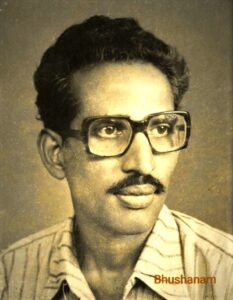 Telugu: Bhushanam
Telugu: Bhushanam
[ One should only visit the weekly hats in the agencies of north coastal districts to have a firsthand knowledge of the extent of exploitation that takes place there, even to this day. The ostensible progress publicized in the name of integrating tribal people with the mainstream, in fact, had only alienated them from their land, from their culture, and from their faith and beliefs. There were many writers who recorded this exploitation in their own way, but none come even remotely close to the firsthand accounts of the empathetic teacher … Bonam Nagabhushanam, aka Bhushanam Mastaaru.
Mark how cultural corruption in the name of progress sets in: it starts like a drizzle, develops into a hurricane in no time, and ultimately floods and overwhelms sweeping people of their roots.]
Three hills!
Spreading in three directions!
Agency villages huddled deep into the forests over the hills!
All brought under to the foot of the hills.
Three footpaths down the hills to the plains!
Turned to a Tri-junction!
At the tri-junction, buses from plains below meet from the three directions, and take people to the remote villages in the forests.
The Tea-shack you see over there belongs to Santamma!
It lies between the Gul Mohar tree and the Indian Beech tree at the tri-junction.
Before the rays of the morning sun reach the crown of the hill, fire kindles up in that shack, and shall be put out only after the sun sinks behind another hill.
The tri-junction shall be busy with the hullabaloo of the vehicles, peoples, and their noises. If vehicles vroom and make high-sounding noise, people hail, shout and all speak at the same time. They just come and go in an endless train.
At Santamma’s shack, raw wooden planks lie in both flanks serving as benches.
People, tired after long journey or waiting for their buses, and people who want to extend the conversation on silly roadside fights gather on these benches.
Some of them place order for tea with Santamma and engage in endless conversations. Sometimes they don’t leave even after taking tea.
No matter how pressing engagements she has, Santamma appears cool but looks lost in thoughts, brewing the tea. After serving the orders, she returns to her seat and seems lost in her thoughts.
Every morning, she has to go round for collection of milk for her business. While she is engaged in the search, she will ineluctably be swarmed by old haunting memories…
*
They were the days when there was no tea on the hills!
They were the days when there were only perennial crops, plants, vines, flowers, fruits, trees, and only gigantic and colossus trees on the hills!
What about Birds! Nobody knew how many kinds there were!
Animals? Nobody knew how many species there were!
Amidst all of them … there lived… a tiny … little… man.
And the primitive man lived in abounding happiness!
What about domestic animals!
Just like babies sucking their mother’s milk, udders of milch animals were left to the calves as their birth right!
Then, A man from plains set foot on these hills. He was accustomed to taking tea. He saw the heavy udders of cows and buffaloes heavy with milk.
“Why don’t you milk these animals?” a ‘plains’ question.
“Why? Won’t your babes suckle their mothers? The same way the calves too grow suckling their mothers” was the hill’s answer.
Roads got laid! People from the plains descended these places. Erected shacks in the agency-way. Serving only tea to the hills, appropriated milk, and all milk products from the hills.
Those practices changed.
Milch animals were reared only for their milk.
Hills bred milch animals. Plains fattened on its ‘bloody’ cheese.
What a change! A transformation brought about by the civilized man for his business interests. As subtle as milk adulterated with water!
It’s just impossible to find unadulterated milk there!
*
At the three-way junction, Santamma was walking up to her shack with milk bowl in her hands and other material in a Corf overhead. There was no end to her train of thoughts…
*
Those were the days when the business of the people from the plains flourished without reins:
Man started owing something to another. The more the delay in repayment, the larger the principal grew. Any failure in settling the dues resulted in owning the man, his possessions, and fruits of his labor! Thousands of people leading a life of slavery under one man!
All hills suffered from the same misery! The same wretchedness pervaded everywhere.
One fine morning, right at the moment of dawn, a squad of publicity committee arrived at this place.
They had flags in their hands!
All of them raised the same slogan! All held their fists tight in unison!
To the chief squad that visited her shack, Santamma served tea. And the weary team acclaimed the tea served by Santamma. Her heart leaped with joy for their plaudits.
The man who held Santamma’s hand was a renowned archer in those area.
The arrow leaving his bow, never missed its aim!
Her archer joined the squad lost in their shower of praises.
There were serious discussions in her house! Decisions! Confirmations! Criticisms! And self-introspections!
The hill visualized a new truth! Hill appropriated a different reasoning! It assumed new hues! The winds warmed up over the hills!
The slogans raised in one voice by the publicity committee, reverberated in the bowstrings of the archers of the hills as their war cry!
It echoed in all directions like ‘Om,’ the deliverance!
And her archer merged into that Om.
Tears swelled up in wide, bright eyes of Santamma.
And the area was inundated with tears! Tears!! Tears!!!
It was an age of tears!
And in that age of tears, Santamma lived all alone!
And in the age of tears, Santamma had no sense of time ticking!
And in that age of tears, Santamma met a different human being. His vehicle stopped before her hut.
The visitor was young and sharp-eyed as her archer. He was quite tall! His figure exuded tenderness. He appeared to her like the right person who could gently dry the tears of the hill and set up a new order.
“Mother!” he addressed Santamma.
That addressing, seemed to her, was capable arousing kindly disposition in anybody reaching their finest, sensitive, inmost being.
“Mother! Why do you languish in endless wailing? I can make necessary arrangements. You start a teashop at the junction. By mingling with people, you could forget your past,” he said.
She looked at him ashamed and in surprise, at the same time. How did he know that she could prepare tea well?
To her staring looks, he looked back at her in a way that suggested he was asking for her response.
There was no deception or artifice in those looks. She could not say ‘No!’
*
After her archer and her own time had fled, selling tea was only an avocation that kept her busy.
Santamma, who won the accolades of the squads and squad leaders once, was selling tea to employees and people from colony from her wayside shack.
Serving tea! Collecting money!
What change was there in her— in her lifestyle— and in her mien!
Entering the tea selling business, she was able to notice what was going on around now:
New colonies, offices, schools, and new buildings had come up of late.
Wired poles came up – and with them glowing lights of different hues.
Dazzling lights replaced the faint luminescence of oily flambeaus.
Yokes and overhead baskets disappeared. Men and women started going to hats on bicycles together.
There were white-collared chairs in offices. The homes of these chairs flaunting varied fashions and decorations. And the poor hills imitating those guilt shades.
It was all a mess and a chaos.
With felling of trees, parrots disappeared.
With the disappearance of native fruits all varieties of birds disappeared.
With the arrival of lorries, gigantic and colossus trees disappeared, and with them the wild animals.
With food crops yielding place to commercial crops, the verdure skyline of the hillside was replaced with dwarfish greenery of shrubs and bushes.
She was tempted to believe that behind every eulogized ‘modern’ change, there might be some serious, but subtle, selfish motive.
Behind the language and attire which have lost their native touch, she could clearly hear life’s white lies.
Just as every spark of lightning has a setting of huge expanding black clods, behind every enterprise that reflects modernity, she could feel the usurping hands of big business.
She was getting restless whenever the idea that a new lie, entering innocuously into the life stream of the tribes at the three roads junction, in the colonies down the hills, and deep into the forests over the hills, was growing leaps and bounds.
*
Lost in thoughts, Santamma kindled the fire in her shack.
The first bus, in its wont manner, disturbed the early morning tranquility with its noise from a distance. Marking its arrival from the noise, she added more fuel to fire to activate it.
The bus stopped at the three-roads junction.
A young maid, a daily passenger who changed bus, got down the bus as pompously as ever. She waved her hand towards a male face sticking through the glass window in her customary way. To the unsatisfied man in the bus, she blew a kiss after touching her lips with her palm. Looking at her palm through the window, he made a return gesture of kissing it back with pouted lips.
Santamma looked at the man’s face. It did not seem familiar.
The bus left carrying that new face. The young maid walked into the shack. As she walked into the shack, she shot her routine question, “Granny! Has my bus arrived?”
“Not yet,” replied Santamma.
“Are you sure?” she expressed, routinely, her doubt for the reply.
Santamma felt as if someone was intentionally and violently snipping her sensitive nerve.
“Fie upon these liars! Reaching out to these hills, these liars transform the few vestiges of truth left here to lies! Every day I tell her the truth! Still, she doubts my reply and stresses, ‘True? Are you Sure?’ Why? Will these people never speak the truth to anybody? Does all their education and all their civilization teach them nothing but falsification?
“Do all these people lead prevaricated lives?
“Is it to spread this falsified knowledge these people come all the way to work here? If these people inhabit the hills, won’t the tribals get used to lying and embrace their own ruin? How much more should they shed? What more misery awaits them?” Santamma was terribly disturbed with her thoughts.
But the young maid, unperturbed, was waiting for her bus.
She was reminded of the officer who came after everything had gone wrong.
“Did he intend me to live in this wayside hut only to show how subtly he would transport the lies on this hilly countryside? For me to watch? “
Santamma threw some water in anger over the burning coals in the stove.
His first calling her as ‘Mother’ echoed from the deep recesses of her heart for a moment.
The intense emotion behind that calling could touch the most sensitive parts of one’s being.
There is resonance of ‘Om’ in the most powerful word ‘Mother!’
The timbre of the first syllable uttered worshipping the primal womanly form!
“No! He was not such a person! Didn’t the war cry protesting the injustice was mercilessly quelled earlier? The same way, every good will be turned into a lie someday. Lie aggresses truth. Before the flames of lies surround these forests, I must ask him to put out these fires,” she decided and walked up to the office.
When she enquired about him, they replied that he was transferred.
Disappointed and distressed, she was walking back home lost in thoughts.
“When someone starts something in the hope that it will turn out to be good, why don’t they keep the persona there to oversee if his actions are really turning out good or not? And if such good people are not kept in their places, how could these good people uphold any good? How could they protect and perpetuate any good system or order?”
She was at a loss with the ways of the world.
By the time she returned home, her shack was razed to the ground! They replied that organization was going to build a bus-shelter for the passengers!
What is this atrocity?! What is this injustice?!
Wasn’t the shack standing all these years serving as shelter for the passengers?
In the hinterland and at the foot of the three hills, the colonies and on the three roads junction- Santamma stood astounded, watching helplessly an officer demolishing what an earlier officer had constructed before, with nobody to question and none owning responsibility to answer.
Over the levelled shack of Santamma, while the Gul Mohar showered some petals, the Indian Beech shook its leaves in grief.
Instead of the familiar hilly breeze, winds of changed enveloped the bemused Santamma now.
In those shrill winds of change, the awestruck Santamma’s ears could hear the faint echoes of ageless Time’s anklet bells — foreboding death and destruction.
*
[First Published in 1990 Diwali Special issue with the title “Kotha Gaali”]



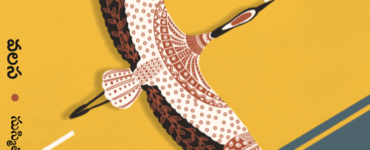

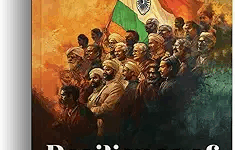
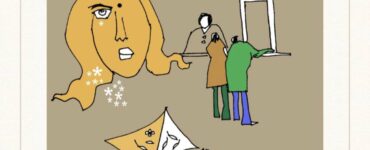
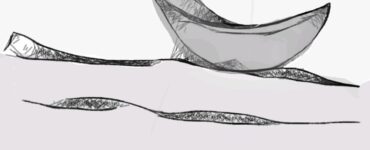
Add comment